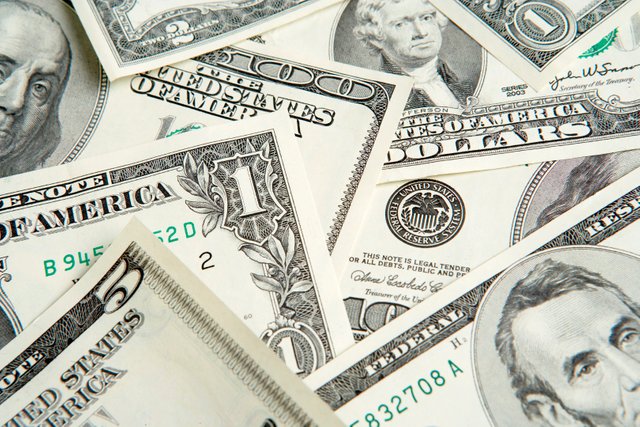
Introduction
I am a big fan of Dan Ariely - the behavioural economist and author of a number of books on human behaviour such as "Predictably Irrational".
I was recently listening to one of my favourite interviews with Dan conducted by our own David Kadavy ( @kadavy - check out his podcast here) and it inspired me to cover one of Dan's studies.
We are all probably familiar with the ethical dilemma of the starving person stealing food to eat.
It seems to be a staple in fiction and philosophy (e.g. Les Miserables).

Many people would not think it immoral to steal food if one is starving. However stealing food in other circumstances would be considered immoral.
It would seem that a visceral state (in this case hunger/starvation) makes a normally immoral action acceptable (at least objectively to others).
What about in a subjective situation? Do such states actually alter people's morality and actions?
This paper looks at how visceral states (like hunger, thirst etc.) affect morality, specifically by seeing how likely people are to cheat to win a hunger or thirst quenching prize.
I will present my TLDR style summary first with the more detailed discussion following afterwards:
The Summary

In an elegant set of 3 experiments the authors showed that people are more willing to cheat in a task to win a food or water prize when they are in a hunger or thirst (visceral) state respectively.
In each case the instances of winning were substantially beyond the 50% wins one would expect from chance, ranging from 68-80%.
Further the cheating did not seem to correlate with the perceived economic value.
This suggests that the cheating and reduction in moral behaviour applies solely to items that will immediately fulfill the visceral need.
To apply this to the often quoted moral example, someone who is hungry is more likely to steal bread, but no more likely to steal something else of equivalent value.
Visceral drives do seem to affect morality but only in ways which serve to directly fulfil them.
The Study Comprised Three Experiments
The study was split up into three separate experiments. Each one was slightly different so I will cover them separately because of this:
Experiment 1

Design/Task
This involved 144 students, staff and visitors at a University of Florida campus food court at lunch time.
The aim was to use a time and location where there were likely to be a substantial number of hungry (as well as non hungry) participants.
They were told they were taking part in a marketing survey about a snack pack (containing potato chips, a granola bar, Snickers bar and a mint).
Participating in the survey would enable them to win one of these packs but there were not enough for everyone to get one.
They were asked a variety of questions about mood and physical state (hunger/thirst etc) as well as how much they would be willing to pay for the pack.
In order to win the prize they had to roll a die in a cup and self report if they won or lost without the ability of the tester to see if they lied.
Rolling an even number resulted in a win, an odd number was a loss.

Results
If the results were purely dictated by chance and people were reporting honestly we would expect 50% of participants to roll a winning number.
In this case 76.5% reported winning and the greater the hunger the greater the probability was that they would "win". That is to say that being hungry increased the likelihood of reporting a winning number.
This suggests that being hungry makes people more likely to cheat than they would if they are not hungry.
Did Economic Valuation Change?
A smaller association was found between the price people were willing to pay for the pack and cheating.
This suggests that the overall monetary value that they applied to the pack was less of a driver to cheat than the hunger state itself.
The implication is that hunger increases cheating in order to satiate the hunger itself rather than for a financial/monetary gain.
Experiment 2

Design/Task
This study looked at thirst. Exercise is a good way to induce thirst and so the experimenters approached people entering and exiting a gym.
Those entering the gym would likely be less thirsty than those leaving and hence would act as a control population for the task.
62 participants were used (Cornell University Students).
They were asked to fill in a questionnaire on mood and visceral states, assign a price to a bottle of water and then think of a number between 1 and 10 to win one of the bottles.
They were told that there were not enough bottles to go round and were informed after thinking of a number (but before saying what it was) that they would win if they guessed an even number.
This gave them the opportunity to cheat by lying about the number they thought of.

Results
As expected participants were thirstier after working out, with a mean score of 2.45 (out of 4, where 4 = extreme thirst) vs a mean of 1.63 before working out.
Thirsty participants "guessed" a winning number 80% of the time as opposed to the 50% one would expect due to chance.
So once again people in a visceral state, in this case being thirsty, were more likely to cheat to win a prize that could quench that thirst.
Interestingly those who took part before working out had a rate of 40% which is less than what one would expect from chance.
Even vs Odd Bias?
The authors suggest this may be due to people having an inherent bias for selecting odd numbers (suggested by past research).
To investigate this further they re-ran the experiment (with 72 subjects) swapping the winning numbers from being even to odd.
In this case the winners were still very similar in the thirsty group at 78.9% but increased to 56.9% in the pre-workout group.
This would suggest a bias for selecting odd numbers, however, it does not affect the outcome.

Financial Value vs Thirst Quenching Value
Again the authors wanted to know if this had any relationship to the price they assigned to it i.e. was this purely to quench thirst or was it a general decline in morality?
In this case thirsty participants did not assign a higher value to the bottle of water.
The authors describe this as a null result because they expected them to assign a higher monetary value.
In the first experiment there was a small but significant difference - not enough to account for the level of cheating but it was present.
This suggests that the desire to cheat is motivated purely by the desire to quench thirst and not by an perceived increase in financial benefit.
Perhaps the viscerally derived value of the prize is considered or conceptualised separately from the cognitive, economic value.
Of course it is possible that one of these results (first or second experiment) represent an anomaly as it relates to the economic valuation.
It is also possible that there is a difference in how the two different visceral states alter judgement.
Neither of these possibilities are sufficient to negate the rather large correlation between cheating and visceral states.
Experiment 3

Design/Task
The third experiment sought to examine and clarify the issue of economic vs visceral reward value.
The same basic method of manipulating thirst and using gym attendees from experiment 2 was used.
However in this case 91 people were split between being offered a bottle of water or a souvenir pen (of the same value).
Results
Thirst was again found to be higher in post workout subjects with a mean of 2.48 vs 1.77 pre workout.
Before working out 45% of people won the water (slightly below chance), whereas 60.9% won the pen.
This suggests people were cheating to win the pen when they were not thirsty!

Cheating to Lose?
People who were thirsty (after working out) won the water 68% of the time and interestingly only won the pen 30.4% of the time (half the value for the non-thirsty group).
This finding suggests that thirsty people actively "lose" when the prize is the pen despite the financial value being the same.
It also confirms that cheating to win in the thirsty state is only related to winning items which will directly affect that state.
They actively "cheated" to lose the pen even though the financial value was the same.
This suggests a lower overall value being attributed to the pen in the more thirsty state in spite of this.
Moral Virtue?
Although the authors talk about this as being cheating I think this needs needs to be distinguished from a moral perspective.
Whilst still a form of dishonesty, one could say that cheating to lose could be considered a more morally "virtuous" form of cheating.
To me this result suggests that moral standards only decline in relation to the prize that will satiate the visceral drive (i.e. thirst) which is consistent with the previous experiment.
Further Discussion, Limitations, Problems
These results are interesting because they suggest that morality can be affected by visceral states such as hunger and thirst.
This makes some implicit sense from an evolutionary perspective.
Just as interesting is the point that the decline in morality only seems to pertain to items that might immediately quench the visceral state.

Inconsistent With Drug Addiction?
This makes sense but may be inconsistent (according to the authors) with certain other types of criminal behaviour:
It is known for example that drug addicts will often steal items to sell and buy drugs.
This would seem to contradict the findings here in that in that particular case the immoral behaviour does not result in a direct fulfilment of the visceral drives.
The authors suggest that this is because other cognitive mechanisms may be involved in that process resulting in greater premeditation.
I think there may be a simpler answer though.
In the case of drugs whether they are legal or illegal they are much more difficult to get hold of and hence steal than a loaf of bread or bottle of water.
Prescription drugs of abuse like opioids are kept under tight security. Illegal drugs are not as widely available and are likely to be kept just as secure by those who are selling them.
It is likely that drug addicts are forced to take the extra steps of stealing and selling other items because the option of stealing drugs directly is not available to them.
Multipart Design
Overall I think this study is well done and presented.
The way the experiments were split up into three parts is quite elegant and suggests a good way of keeping things simple and breaking down the effects being studied.
It also helps to reduce confounding variables which I will discuss later.

Sample and Resource Limitations
As most people will be aware psychology gets criticised a lot for being a soft science and unfortunately there are limits to how much can be done to tackle this.
Dealing with human behaviour and motivations is by definition more complex than simply measuring a variable like the voltage in a wire.
It is also constrained by the generally high resource and time cost that comes from the involvement of people.
Ideally larger sample sizes would help to increase the validity but that would also hugely increase the cost.
It would likely be more viable to collate the results of multiple studies similar to a meta-anlysis in medical research.
As I have discussed before this is not as good as a properly designed single study of equivalent size but it does give you evidential validity which is somewhere between the two.
Recruitment
I would be remiss if I did not mention the recruitment which involved a specific population i.e. people on university campuses.
Is it possible that these people are in some way different and have different responses to other parts of the population?
I think it unlikely but the only way to know for sure would be to compare with other groups by repeating in different locations.

Confounding Variables
Another major area of concern with psychology (and medical research) is that of confounding variables.
I think here the main potential confounding factor of the economic value of items is well addressed both by splitting the experiments up and using extra measures.
Where more than one choice was available the financial value was equal. In other cases the economic valuations between the different groups were compared.
This helps to illustrate that the change in morality was specific to items that would reduce hunger/thirst rather than other items.
This reduces the likelihood that other motivations were involved in the change and also suggests that overall morality is not impaired.
Very Well Written and Presented
Unlike a lot of studies that I read this one is really well presented in terms of how easy it is to read and follow.
I don't think it is a coincidence that Ariely is a best selling and thoroughly enjoyable writer.
Obviously papers are rarely written by one person and in this case I think all the authors should be commended on this.
Good communication is sadly one of the most neglected aspects when it comes to presenting research.
Conclusion

This is a fascinating and well presented study which suggests that morality is indeed altered by visceral states.
Further the alteration is not necessarily a global change in morality but only favours outcomes which directly satisfy the visceral state such as hunger.
References
- Williams, Elanor F., David Pizarro, Dan Ariely, and James D. Weinberg. 2016. “The Valjean Effect: Visceral States and Cheating.” Emotion 16 (6): 897–902.
Thank you for reading

Before you go have you filled in the Coinbase form to list STEEM? It only takes a few seconds. THIS POST shows you how.
If you like my work please follow me and check out my blog - @thecryptofiend
Uncredited Images are taken from my personal Thinkstock Photography account. More information can be provided on request.

Hello @TheCryptoFiend,
Congratulations! Your post has been chosen by the communities of SteemTrail as one of our top picks today.
Also, as a selection for being a top pick today, you have been awarded a TRAIL token for your participation on our innovative platform...STEEM.
Please visit SteemTrail to get instructions on how to claim your TRAIL token today.
If do not wish to be promoted by SteemTrail, please reply with "Stop" to opt out.
Happy TRAIL!

Downvoting a post can decrease pending rewards and make it less visible. Common reasons:
Submit
Thank you:)
Downvoting a post can decrease pending rewards and make it less visible. Common reasons:
Submit
Too busy to read the whole thing, but I'll just answer the topic: yes.
Our compassios in general is dictated by whether or not we're hungry, and what kind of an access we have to food if need be.
A good friend of mine once said that "Morality is a luxury for those who can afford it".
Point being that when you're in a position where you never need to shoplift for food, it's easy to say shoplifting is wrong. That person never has to challenge that stance.
Downvoting a post can decrease pending rewards and make it less visible. Common reasons:
Submit
Yes thanks:)
Downvoting a post can decrease pending rewards and make it less visible. Common reasons:
Submit
Upvoted anyway because I'm a nice guy like that. I'll read the whole thing later.
Downvoting a post can decrease pending rewards and make it less visible. Common reasons:
Submit
Thanks! There is no rush and also I made the summary so people could get the gist of it.
Downvoting a post can decrease pending rewards and make it less visible. Common reasons:
Submit
Survival trumps morality in lower consciousness choices. Real living and life is when we choose how to survive based on moral comprehension and not be driven by lower consciousness basic survival drives. Higher order reasoning is where morality can shine and overcome our immoral behavior.
Downvoting a post can decrease pending rewards and make it less visible. Common reasons:
Submit
I believe morality as a concept came about when we had such living conditions that we could afford to ponder such questions in the first place.
Downvoting a post can decrease pending rewards and make it less visible. Common reasons:
Submit
Very good point.
Downvoting a post can decrease pending rewards and make it less visible. Common reasons:
Submit
I agree :)
Downvoting a post can decrease pending rewards and make it less visible. Common reasons:
Submit
Wow, it's an honor to have you listen to my podcast, and even better to have it inspire a great article like this! Thank you so much for the hat tip.
Downvoting a post can decrease pending rewards and make it less visible. Common reasons:
Submit
Thank you for making such a great show. I am still enjoying going through the back catalogue! I love podcasts because I can do healthy activities like walking or working out and learn something new. Thank you for all the effort you put in I'm sure I'm not the only one who has been inspired by your work!
Downvoting a post can decrease pending rewards and make it less visible. Common reasons:
Submit
I absolutely love this post! Well done @thecryptofiend !
Downvoting a post can decrease pending rewards and make it less visible. Common reasons:
Submit
Thank you so much for your kind words!
Downvoting a post can decrease pending rewards and make it less visible. Common reasons:
Submit
Intelligent work, and well writing. I like this.
Downvoting a post can decrease pending rewards and make it less visible. Common reasons:
Submit
Thank you:)
Downvoting a post can decrease pending rewards and make it less visible. Common reasons:
Submit
This post has been ranked within the top 25 most undervalued posts in the second half of Feb 13. We estimate that this post is undervalued by $15.97 as compared to a scenario in which every voter had an equal say.
See the full rankings and details in The Daily Tribune: Feb 13 - Part II. You can also read about some of our methodology, data analysis and technical details in our initial post.
If you are the author and would prefer not to receive these comments, simply reply "Stop" to this comment.
Downvoting a post can decrease pending rewards and make it less visible. Common reasons:
Submit
Great post. Upvoted and resteemed.
Downvoting a post can decrease pending rewards and make it less visible. Common reasons:
Submit
Thank you for your support:)
Downvoting a post can decrease pending rewards and make it less visible. Common reasons:
Submit
The sample sizes are really small. I wonder if the results would hold up with really large (like 10,000 or more people) sample sizes. Or if the observations were just statistical anomaly. It stands to reason that the observations are true (I think to my self... duh people are going to cheat to get food when they are hungry, more than if they aren't). Still I'm just curious.
Downvoting a post can decrease pending rewards and make it less visible. Common reasons:
Submit
Yes that is almost always the problem with these kind of studies. I think a really big sample size would be really unlikely due to the costs involved - the best we are likely to get are repeats with similar sizes.
Downvoting a post can decrease pending rewards and make it less visible. Common reasons:
Submit
Yeah, Well in reality repeats are as good as increasing the sample size so long as the experiments are performed similarly and the generated data is comperable. So hopefully more is done to increase (or decrease) the certainty here. :)
Downvoting a post can decrease pending rewards and make it less visible. Common reasons:
Submit
I suspect they will be done but you never know - unlike drug trials these psychology experiments sometimes get overlooked for repetition.
Downvoting a post can decrease pending rewards and make it less visible. Common reasons:
Submit
It's likely because repetition experiments are difficult to publish. The results are no longer sexy once they are already out in the world (despite how important repetition studies are).
Downvoting a post can decrease pending rewards and make it less visible. Common reasons:
Submit
Very good point! It is especially true in psychology where everyone wants the next new thing:) Sadly it means that we end up with weaker validity.
Downvoting a post can decrease pending rewards and make it less visible. Common reasons:
Submit
Very informative article, with interesting experiments. From my personal experience I will say that my behavior changes dramatically when I'm hungry...not for the better
Downvoting a post can decrease pending rewards and make it less visible. Common reasons:
Submit
Thanks, me too I think!
Downvoting a post can decrease pending rewards and make it less visible. Common reasons:
Submit
It makes sense really.
With regards to the drugs I would also think how addictive the drug was, such as heroine which seems over-ride all morals.
I have a friend in Liverpool ho deals with heroine addicts and he told me that literally steal from their mothers or their or children.
Also in extreme cases I the survival instinct pushes aside our moral base completely out the window
Wasnt there a famous case years back of a plane crashed and people survived by eating the dead. If I recall no one judged them badly for this.
Very interesting.
Downvoting a post can decrease pending rewards and make it less visible. Common reasons:
Submit
Yes it was in the 1970s. Basic drives do seem to over-rule morality.
Downvoting a post can decrease pending rewards and make it less visible. Common reasons:
Submit
For me it highlights the issue that a law can not ever be made as a solid wall.
That human beings will always have to take such things into account and weigh the up moral dilemma.
I mean could we ever create a bot to judge such things?
Im not so sure.
Downvoting a post can decrease pending rewards and make it less visible. Common reasons:
Submit
Exactly I think you are right.
Downvoting a post can decrease pending rewards and make it less visible. Common reasons:
Submit
Human psychology can be fun. I was in the U.S. Army in 1998. I have witnessed first hand that hunger can affect morality. Several of the trainees that came in overweight but still with regulations were put on a diet. When, I look back on it now, the diet was horrible. Calorie in calorie out mentality that puts the body into starvation mode. Anyways, these privates were always up to something. We caught one at the PX stealing M&M's. Another in a different squad attempted to steal an entire log of Skoal. When they were on KP duty, they steal peanut butter and run into the restroom to eat it with their fingers. They would also get privates that were in shape to buy them Powerade out of the vending machine. It was crazy!
Downvoting a post can decrease pending rewards and make it less visible. Common reasons:
Submit
Thanks for sharing your experience. I think it makes a lot of sense. People will do pretty much anything to eat/drink if they are hungry or thirsty!
Downvoting a post can decrease pending rewards and make it less visible. Common reasons:
Submit
another great post ;>
How about this one:
"Cheating" is almost always associated with lust, which I will argue is even more visceral than hunger ;>
Downvoting a post can decrease pending rewards and make it less visible. Common reasons:
Submit
I hadn't thought about that! In the paper in the discussion the authors do refer to sexual morality and whether that is affected in similar ways. I might see if I can get access to the paper which they were referring to:)
Downvoting a post can decrease pending rewards and make it less visible. Common reasons:
Submit
I was going to bring up this point exactly. The argument can be made that sexual satisfaction is just as visceral a need as hunger and thirst (although maybe not as often for most of us). Does this mean that at times a person can actually justify sexually immoral behaviors or even sexually violent behaviors to satisfy that need? I would be very interested in that paper as well. Hopefully you can find it and write a follow up post!
Downvoting a post can decrease pending rewards and make it less visible. Common reasons:
Submit
Thanks yes I think that is what they were suggesting. I will see if it is open access if not I will post it later when I am back at work and can get academic access. The big problem these days is that about 2/3 of papers are still behind paywalls.
Downvoting a post can decrease pending rewards and make it less visible. Common reasons:
Submit